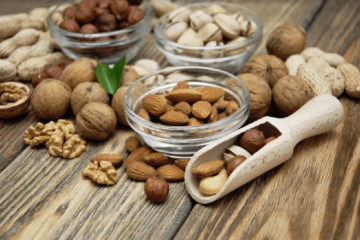Electrolytes - Why you should stay hydrated both during exercise and throughout the day

Sodium, potassium, calcium and the like – everyone has heard of at some point, but perhaps not since their chemistry lessons at school. These are so-called electrolytes. They control the distribution of water in the human body, regulate our acid-base balance and promote the transmission of stimuli between muscle and nerve cells. This is only a fraction of the tasks they are involved in. Electrolytes are essential and yet largely unappreciated, despite their supportive role in the body.
In this article we will look at the various kinds of electrolytes, their purposes in the body and how you can make sure that you are getting enough.
What are electrolytes?

Electrolytes are particles of minerals that are soluble in liquids, such as water. To be more precise, they are ions with a positive or negative electric charge. These tiny particles have the ability to conduct electricity in an aqueous environment. In the human organism, electrolytes are found in the blood in dissolved form and exist in a so-called “electrolyte balance”. This means that the concentration of electrolytes is always the same both inside and outside cells.
Electrolytes are categorised as essential nutrients. This means that the body cannot produce them by itself. Thus, they must be obtained via the diet.
The functions of electrolytes are much more diverse and important than many believe. Essentially, electrolytes ensure proper distribution of water in the body, regulate the blood’s acid-base balance and support the transmission of stimuli between muscle and nerve cells.
Electrolytes and their functions: The Basics

| Electrolyte | Functions |
|---|---|
| Sodium |
|
| Potassium |
|
| Calcium |
|
| Chloride |
|
| Magnesium |
|
| Phosphate |
|
How electrolytes behave in the body
Electrolytes support the cells of the human body in their everyday tasks and functions. In order for the cells to work optimally, it is important that the number of electrolytes inside the cell is in equilibrium with that outside the cell. Simply put, the body is constantly striving for balance. To create this balance, the body requires sufficient hydration, since the water and electrolyte balances are highly dependent on each other. Accordingly, even something as seemingly inconsequential as low fluid intake can lead to an imbalance of water inside and outside the cell. As a result, symptoms such as dizziness or nausea would likely arise.
The regulation of the natural water balance, and thus also the electrolyte balance, occurs mainly through the simultaneous loss of water (in urine, faeces (stool) and breathing) and intake of water (via food and drink) in the body.
Tip: Find out all you need to know about thirst, hydration and the water balance here.
The signs of a disturbed electrolyte balance

A disturbance of the body’s electrolyte balance may well occur from time to time. Frequent vomiting, heavy perspiration, blood loss and even acute or chronic kidney disease can cause an excessive loss of electrolytes. In addition, an excess of alcohol leads to electrolyte loss which is responsible for some of the hangover symptoms the following day.
An acute, short-term disturbance of the electrolyte balance may cause the following symptoms:
- Low or high blood pressure
- Pins and needles
- Muscle cramping
- Dizziness
- Vomiting
- Reduction in reflexes
- Constipation
If an electrolyte deficiency or overdose is chronic (i.e., it persists for a longer time) serious, albeit rare, symptoms can occur:
- Dysfunction of the heart
- Hypokalemia (insufficient potassium in the blood)
- Osteoporosis (weakening of bones)
- Rickets (in children)
- Growth disorders
Electrolytes and exercise

Everyone has, at some point, taken part in a particularly strenuous exercise session and worked up a good sweat. What is the one thing you couldn’t have gone without? Water, of course! After all, what could be better for you than keeping yourself hydrated during and after exercise?
Apart from the pleasant, refreshing feeling of drinking water during exercise, adequate hydration is essential for the human body. During exercise, the body loses a lot of fluid in the form of sweat which also means a lot of electrolytes are lost. In order to compensate for this, it is essential to drink enough.
For amateur or casual athletes who exercise for no more than 2 hours at a time, it is quite enough to opt for your everyday mineral water. Mineral water, as the name suggests, is rich in minerals (electrolytes), such as sodium, potassium or magnesium. However, if you are physically active for sessions longer than 2 hours or do an extreme sport, it is advisable to make use of electrolyte gels or isotonic sports drinks to ensure you provide your body with enough electrolytes and thus keep them in balance.
Tap water (as opposed to mineral water) is also perfectly adequate!
Keep your eyes peeled when buying isotonic sports drinks
What are isotonic sports drinks? Isotonic drinks are liquids that have a particularly high electrolyte concentration. Thanks to this, they strongly resemble human blood and can be absorbed quickly in the intestine.
Attention: Not every isotonic drink is beneficial or useful. More and more often, non-alcoholic beer is advertised as an isotonic drink. This is correct per se, since beer contains some nutrients and is digested relatively quickly by the body. However, this makes little sense for an athlete, since the body loses other nutrients, such as sodium, in higher quantities during a workout, and these are scarcely present in non-alcoholic beer. If you are an athlete, you should choose a more suitable drink. You should also pay attention to the sugar content – isotonic drinks don’t have to be sugar bombs! Often a simple glass of diluted squash with a pinch of salt is completely sufficient.
Find out everything you need to know about sugary drinks here.
Marathon Runner Phenomenon
Especially in endurance sports such as marathon-running, there may be episodes of heavy sweating, as a result of which the electrolyte balance could be disturbed by the increased fluid loss. Of course, this should be counteracted with sufficient hydration. This is exactly the thought process that some marathon runners had a few years ago. Since the runners sweated a lot, many believed that they had to drink a lot to compensate. Some consumed such high amounts of water or dietary supplements that were rich in electrolytes that they overdosed on sodium. As a result of this short-term excess of electrolytes, hypernatremia (= too much sodium in the blood) occurred. This caused some of these runners to experience nausea and seizures afterwards, while a few even fell unconscious. This eventually came to be known as the “marathon runner” phenomenon.
Foods containing electrolytes and the recommended amount

| Electrolyte | Found mainly in | Recommended amount (NHS) | The following lists contain your RDA: |
|---|---|---|---|
| Sodium |
|
2.4 g/day (about 6 g of table salt or one level teaspoon) |
|
| Potassium |
|
3,500 mg/day |
|
| Calcium |
|
700 mg/day |
|
| Chloride |
|
3,100 mg/day |
|
| Magnesium |
|
|
|
| Phosphate |
|
550 mg/day |
|
5 tips for a good electrolyte balance
- Drink tap water! British tap water is nutrient-rich and subject to strict quality controls.
- Drink at least one glass of water with each meal.
- Salt your food enough. Be careful not to use more than 1 teaspoon per day.
- Reduce your intake of processed foods. About 70% of salt intake comes from processed foods (hidden salt) in a typical diet.
- Make sure to keep hydrated while exercising.
Conclusion
By now, you have probably gathered how important electrolytes are for your body. This is exactly why you should always pay attention to your electrolyte balance, otherwise symptoms such as dizziness or nausea may occur.
For all hobby and casual athletes out there: don’t overdo it – just make sure to drink enough. If you are a high-performance athlete who runs marathons, then isotonic drinks or electrolyte gels can be useful.
Nevertheless, if you eat a balanced diet and drink enough water, then you should be on the safe side.
Frequently Asked Questions
Which drinks contain electrolytes?
You can find electrolytes in all mineral water, but also in conventional tap water. Another option is isotonic drinks, which contain high levels of electrolytes and are more suitable for longer exercise sessions. Tip: a glucose solution, which you can make yourself from a little tap water and about 2 tablespoons of glucose, will also work.
What do you need electrolytes for?
Electrolytes are essential nutrients and have various functions which support the human body. For example, they ensure the correct distribution of water, the regulation of the acid-base balance in the blood and an optimal transmission of stimuli between muscle and nerve cells.
What are the main symptoms of an electrolyte deficiency?
A distinction is usually made between a short-term and a long-term deficiency. The following symptoms may occur in case of a short-term deficiency:
- Low or high blood pressure
- Pins and needles
- Muscle cramping
- Dizziness
- Vomiting
- Reduction in reflexes
- Constipation
If you have one or more of these symptoms at the same time, you should see your doctor to avoid a more serious, long-term deficiency.
Sources
- NHS (last reviewed 2021): ‘Salt: the facts’. Retrieved from https://www.nhs.uk/live-well/eat-well/food-types/salt-nutrition/ on 14.02.2023.
- NHS (last reviewed 2020): ‘Potassium’ in https://www.nhs.uk/conditions/vitamins-and-minerals/others/. Retrieved on 14.02.2023.
- NHS (last reviewed 2020): ‘Calcium’. Retrieved from https://www.nhs.uk/conditions/vitamins-and-minerals/calcium/ on 14.02.2023.
- Turck, D. et al. (2019): ‘Dietary reference values for sodium’. EFSA Journal, 17(9). Available at: https://doi.org/10.2903/j.efsa.2019.5778. Table 3: ‘Summary of dietary reference values for chloride’.
- NHS (last reviewed 2020): ‘Magnesium’ in https://www.nhs.uk/conditions/vitamins-and-minerals/others/. Retrieved on 14.02.2023.
- NHS (last reviewed 2020): ‘Phosphorus’ in https://www.nhs.uk/conditions/vitamins-and-minerals/others/. Retrieved on 14.02.2023.



